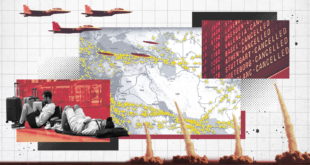MOGADISHU (AP) — Sporadic gunfire rang out in the Somali capital Thursday, witnesses said, a day after some of the heaviest recent fighting in Mogadishu killed at least 20 people when an Islamic militia battled forces that have challenged clerics’ growing power. Some Islamist clerics, however, denounced the fighting and pressed both sides to negotiate unconditionally for an end to the conflict.
“This fighting has nothing to do with religion,” said Sheikh Hassan Indho Giir, chairman of an Islamic Court in the Hararyalleh neighbourhood of Mogadishu.
Both sides reinforced their positions overnight with combatants, arms, ammunition and trucks mounted with anti-aircraft guns. Commanders held meetings late into Wednesday night to plot military strategy. There were no immediate reports of injuries Thursday.
Islamic militiamen, wearing civilian clothing and hiding their weapons, travelled Wednesday in public buses to a checkpoint in a residential neighbourhood controlled by a member of a new alliance of warlords and armed businessmen.
They jumped out of the vehicles and seized control of three trucks mounted with machineguns there, witness Bashir Jumaleh said.
The 20 dead included civilians and combatants, killed in the fighting or in the crossfire, medical workers, militia commanders and witnesses said.
More than 63 militiamen and civilians, including a 3-month-old boy, were wounded in the clashes in northern Mogadishu, doctors said.
Both sides used rocket-propelled grenades, anti-aircraft guns, machineguns, assault rifles and hand grenades. Dozens of people fled their homes. Fighters loyal to members of alliance gradually gained the upper hand as the day progressed, pushing Islamic militia from the checkpoint and other areas they had occupied during the day.
Somalia has been without an effective central government since 1991, when warlords overthrew the government and then began fighting each other.
Fundamentalist Islamic clerics have increasingly sought to set themselves up as an alternative to the clan-based fiefdoms and the transitional federal government that is struggling to assert its authority.
The businessmen and warlords formed their alliance last month, describing the fundamentalist clerics as terrorists and accusing them of killing moderate intellectuals, Muslim scholars and former military officials in a string of unexplained murders.
The two factions first clashed soon after the alliance was formed, in a four-day battle beginning February 18 that killed at least 22 people and wounding more than 120 others.
 Eurasia Press & News
Eurasia Press & News


